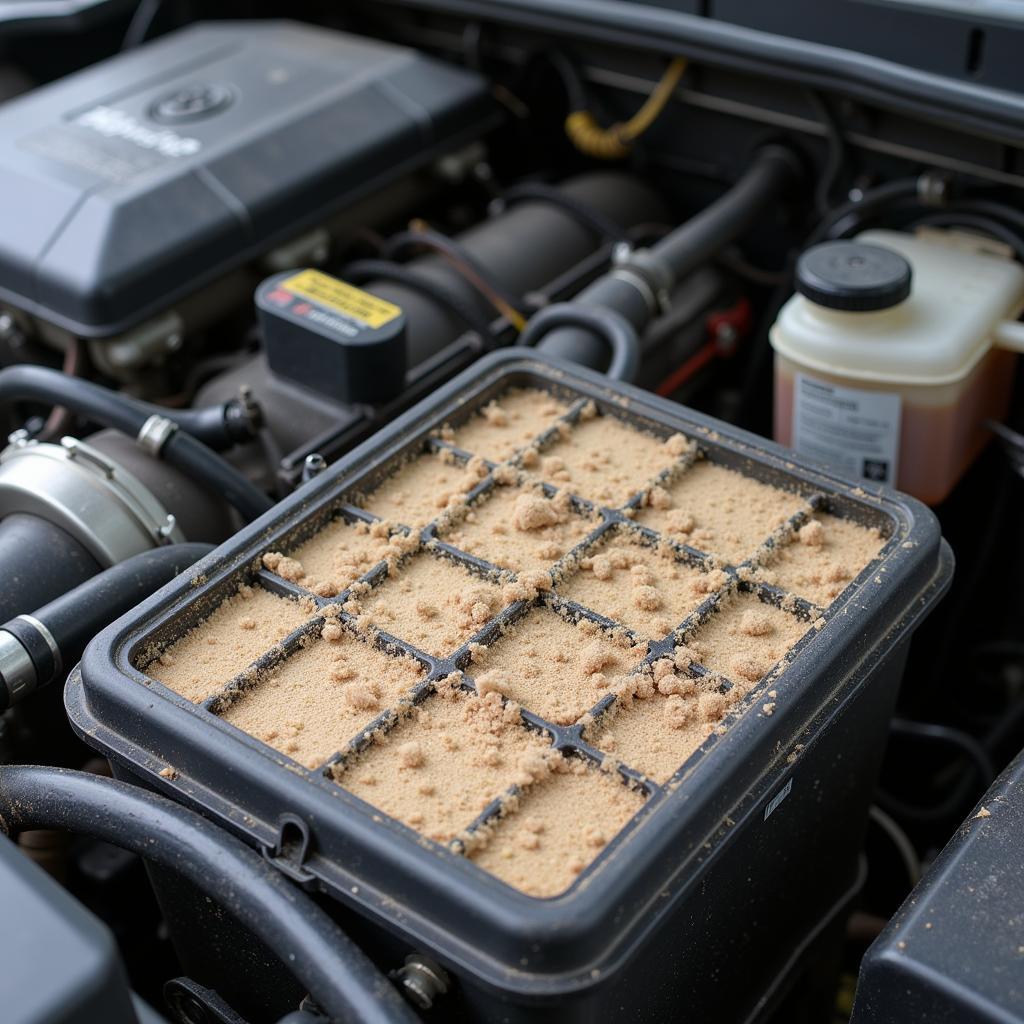Want to boost your car’s pickup? Knowing what to repair to make car pickup increase can significantly improve your driving experience. Several factors can contribute to sluggish acceleration, from simple maintenance oversights to more complex mechanical issues. This article will explore the common culprits behind poor acceleration and guide you through the necessary repairs to get your car back to its responsive best.
Common Causes of Poor Car Pickup
A decrease in your car’s pickup, or acceleration, can be frustrating and even dangerous. Pinpointing the exact cause is crucial for effective repair. Here are some of the most common reasons your car might feel sluggish:
- Dirty Air Filter: A clogged air filter restricts airflow to the engine, hindering combustion and reducing power.
- Worn Spark Plugs: Spark plugs ignite the air-fuel mixture in the engine. Worn plugs can misfire, leading to incomplete combustion and reduced power.
- Faulty Fuel Injectors: Fuel injectors deliver fuel to the engine. Clogged or malfunctioning injectors can disrupt the air-fuel mixture, resulting in poor acceleration.
- Catalytic Converter Issues: A clogged catalytic converter restricts exhaust flow, reducing engine efficiency and impacting acceleration.
- Transmission Problems: Issues within the transmission, such as slipping gears or low fluid levels, can significantly affect acceleration.
- Sensor Malfunctions: Various sensors, like the mass airflow sensor (MAF) or oxygen sensor, provide crucial data to the engine control unit (ECU). Malfunctioning sensors can lead to improper fuel delivery and reduced power.
 Dirty Air Filter Reducing Car Pickup
Dirty Air Filter Reducing Car Pickup
How to Diagnose and Fix the Problem
Diagnosing the root cause of poor acceleration often requires a systematic approach. Here’s a breakdown of how to identify and fix the common issues:
Checking the Air Filter
Inspect the air filter for dirt and debris. If it’s excessively dirty, replace it with a new one. This simple fix can often dramatically improve acceleration.
Inspecting Spark Plugs
Check the spark plugs for wear and tear. Look for signs of corrosion, excessive gap, or damage. Replace worn spark plugs with new ones according to your car’s manufacturer recommendations.
Evaluating Fuel Injectors
Have a mechanic test the fuel injectors for proper function. Clogged injectors can often be cleaned, while faulty ones will need replacement.
Assessing the Catalytic Converter
A mechanic can check the catalytic converter for clogs or damage. A restricted converter will often need replacement.
Examining the Transmission
If you suspect a transmission problem, have a qualified mechanic inspect the transmission for fluid leaks, slipping gears, or other issues.
Diagnosing Sensor Malfunctions
A diagnostic scan tool can help identify malfunctioning sensors. A mechanic can use the tool to read error codes and pinpoint the problematic sensor.
What to Repair to Make Car Pickup Increase: A Summary
Addressing these common issues can significantly improve your car’s acceleration and overall performance. Remember to consult a qualified mechanic for complex diagnoses and repairs.
-
Quick Fixes: Replacing a dirty air filter or worn spark plugs are relatively simple and inexpensive fixes that can often restore lost acceleration.
-
More Involved Repairs: Issues with fuel injectors, the catalytic converter, or the transmission often require professional diagnosis and repair.
-
Preventative Maintenance: Regular maintenance, including tune-ups and fluid changes, can help prevent many of these issues from occurring in the first place.
“Regular maintenance is key to maintaining optimal car performance,” says John Smith, ASE Certified Master Technician. “Addressing minor issues before they escalate can save you time and money in the long run.”
Conclusion
Understanding what to repair to make car pickup increase involves recognizing the common culprits behind sluggish acceleration and taking appropriate action. By addressing these issues promptly and performing regular maintenance, you can keep your car running smoothly and enjoy a responsive driving experience. Remember, a well-maintained car is not just about performance; it’s about safety and reliability too.
FAQ
-
How often should I replace my air filter? Generally, every 12,000-15,000 miles, but check your owner’s manual for specific recommendations.
-
How can I tell if my spark plugs are worn? Signs of wear include corrosion, excessive gap, and damage to the electrode.
-
Can I clean my fuel injectors myself? While DIY cleaning kits are available, it’s often best to have a professional clean or replace them.
-
How long does a catalytic converter last? Typically, around 100,000 miles, but this can vary depending on driving conditions and vehicle maintenance.
-
What are the signs of a transmission problem? Slipping gears, rough shifting, and delayed engagement are common signs.
-
How much does it cost to replace a MAF sensor? The cost varies depending on the make and model of your car but typically ranges from $100 to $400.
-
How often should I have my car tuned up? Consult your owner’s manual for specific recommendations, but generally every 30,000-50,000 miles.
Need More Help?
Check out these related articles on our website:
- Maintaining Your Car’s Engine for Optimal Performance
- Understanding Your Car’s Transmission
- The Importance of Regular Car Maintenance
Need immediate assistance? Contact us via WhatsApp: +1(641)206-8880, or Email: [email protected]. Our 24/7 customer support team is ready to help.

